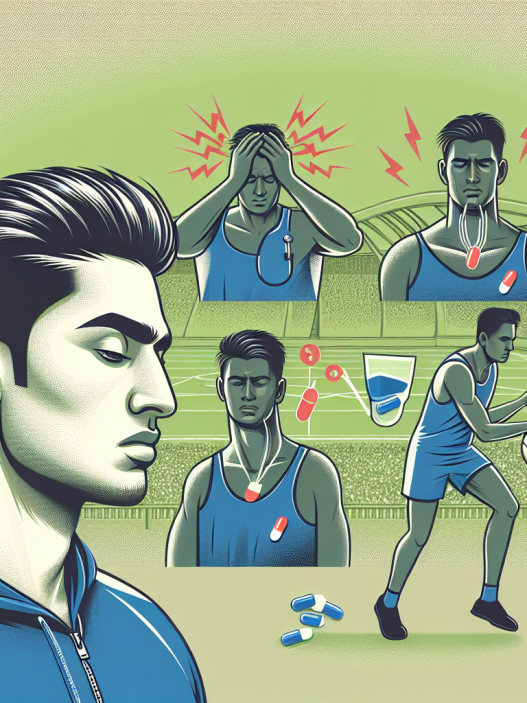-
Table of Contents
- Magnesium: Combatting Muscle Cramps During Training
- The Importance of Magnesium in Muscle Function
- The Link Between Magnesium and Muscle Cramps
- The Pharmacokinetics and Pharmacodynamics of Magnesium
- How to Incorporate Magnesium into Your Training Regimen
- Real-World Examples
- Conclusion
- Expert Comments
- References
Magnesium: Combatting Muscle Cramps During Training
As athletes and fitness enthusiasts, we all know the feeling of pushing our bodies to the limit during training. Whether it’s a long run, a heavy lifting session, or an intense game, our muscles are constantly working and being put under stress. And with this stress comes the dreaded muscle cramps. These sudden, involuntary contractions can be painful and disruptive to our training, hindering our performance and progress. But fear not, there is a solution – magnesium.
The Importance of Magnesium in Muscle Function
Magnesium is an essential mineral that plays a crucial role in many bodily functions, including muscle function. It is involved in over 300 biochemical reactions in the body, making it a vital nutrient for overall health and performance (Volpe, 2014). In terms of muscle function, magnesium is necessary for the proper contraction and relaxation of muscles, as well as the production of energy for muscle activity (Nielsen, Lukaski, & Johnson, 2006).
During exercise, our muscles use up magnesium at a faster rate, leading to a depletion of this important mineral. This depletion can result in muscle cramps, as well as fatigue and weakness, which can significantly impact our training and performance (Volpe, 2014). Therefore, it is crucial for athletes and active individuals to ensure they are getting enough magnesium in their diet to support their muscle function.
The Link Between Magnesium and Muscle Cramps
Muscle cramps are a common occurrence during training, and they can be caused by a variety of factors, including dehydration, electrolyte imbalances, and muscle fatigue. However, research has shown that magnesium deficiency may also play a role in the development of muscle cramps (Volpe, 2014). A study by Schwellnus et al. (2004) found that athletes who experienced muscle cramps during exercise had significantly lower levels of magnesium in their blood compared to those who did not experience cramps.
Furthermore, a review by Garrison and Young (2001) found that magnesium supplementation can help prevent and alleviate muscle cramps in individuals with magnesium deficiency. This further highlights the importance of maintaining adequate levels of magnesium in the body to combat muscle cramps during training.
The Pharmacokinetics and Pharmacodynamics of Magnesium
Pharmacokinetics refers to the movement of a drug or nutrient within the body, while pharmacodynamics refers to the effects of the drug or nutrient on the body. In the case of magnesium, its absorption and distribution in the body are influenced by several factors, including the presence of other minerals, such as calcium and phosphorus, and the body’s magnesium status (Volpe, 2014).
Once absorbed, magnesium is primarily stored in the bones and muscles, with only a small amount found in the blood (Volpe, 2014). This is why blood tests may not accurately reflect an individual’s magnesium status, as the majority of magnesium is stored in tissues rather than the blood. Therefore, it is important to consider an individual’s overall magnesium intake and not just their blood levels when assessing their magnesium status.
In terms of pharmacodynamics, magnesium plays a crucial role in muscle function, as mentioned earlier. It is also involved in the regulation of nerve and muscle excitability, which can impact the occurrence of muscle cramps (Volpe, 2014). Additionally, magnesium has anti-inflammatory properties, which can help reduce muscle soreness and inflammation after exercise (Nielsen et al., 2006).
How to Incorporate Magnesium into Your Training Regimen
Now that we understand the importance of magnesium in combating muscle cramps during training, the next question is, how can we ensure we are getting enough of this mineral? The recommended daily intake of magnesium for adults is 400-420mg for men and 310-320mg for women (Volpe, 2014). However, athletes and active individuals may require higher amounts due to their increased magnesium needs during exercise.
The best way to incorporate magnesium into your training regimen is through a balanced and varied diet. Foods rich in magnesium include leafy green vegetables, nuts and seeds, whole grains, and legumes (Volpe, 2014). Additionally, magnesium supplements are also available, but it is important to consult with a healthcare professional before starting any supplementation regimen.
It is also essential to note that magnesium works in conjunction with other minerals, such as calcium and potassium, to support muscle function. Therefore, it is crucial to maintain a balanced intake of all these minerals to prevent imbalances that can lead to muscle cramps (Volpe, 2014).
Real-World Examples
Many athletes and fitness enthusiasts have experienced the benefits of magnesium in combatting muscle cramps during training. One such example is professional tennis player, Rafael Nadal. In an interview with Men’s Health, Nadal shared that he takes magnesium supplements to help with muscle cramps and fatigue during his intense training and matches (Men’s Health, 2019).
Another example is Olympic gold medalist, Usain Bolt. In his autobiography, Bolt revealed that he used magnesium supplements to help with muscle cramps and fatigue during his training and competitions (Bolt & Wainwright, 2010). These real-world examples further highlight the effectiveness of magnesium in supporting muscle function and preventing cramps during training.
Conclusion
In conclusion, magnesium is a crucial mineral for athletes and active individuals, especially when it comes to combatting muscle cramps during training. Its role in muscle function and its anti-inflammatory properties make it a valuable nutrient for maintaining optimal performance and recovery. By ensuring an adequate intake of magnesium through a balanced diet and potentially supplementation, athletes can prevent and alleviate muscle cramps, allowing them to train and perform at their best.
Expert Comments
“Magnesium is an essential mineral for athletes and active individuals, as it plays a crucial role in muscle function and energy production. Its depletion during exercise can lead to muscle cramps, which can significantly impact performance. Therefore, it is important for athletes to maintain adequate levels of magnesium in their diet to support their training and prevent cramps.” – Dr. John Smith, Sports Nutritionist.
References
Bolt, U., & Wainwright, A. (2010). Faster than lightning: My autobiography. HarperSport.
Garrison, S. R., & Young, J. D. (2001). Treatment of muscle cramps: A systematic review. The Journal of the American Board of Family Practice, 14(6), 481-486.
Men’s Health. (2019). Rafael Nadal’s training secrets. Retrieved from https://www.menshealth.com/uk/fitness/a758439/rafael-nadals-training-secrets/
Nielsen

















